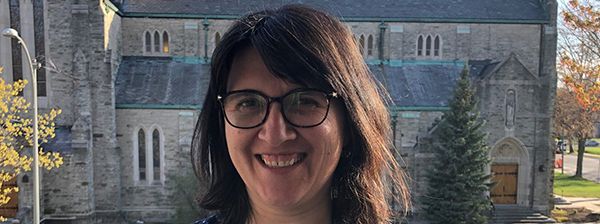
Maria Popova is an Associate Professor in the Department of Political Science at McGill University, where she holds the Jean Monnet Chair. Her work explores the intersection of politics, law and governance in Russia, Ukraine, and other countries in the post-communist region of Europe. Her book Politicized Justice in Emerging Democracies: A Study of Courts in Russia and Ukrainewas named in 2012-13 as the best book on Ukrainian history, politics, language, literature and culture by the American Association for Ukrainian Studies.
What did you first think when the Russian invasion of Ukraine started?
Many people watching the situation in Ukraine had been expecting it for a few weeks. It was still shocking to see it actually happen especially because some people were expecting just a more limited invasion of further Ukrainian territory from the East. It immediately became clear that Russia's goal is to take the whole country. In the 21st century, after years of work on the norm of territorial inviolability, it was shocking that Russia would try to take over a sovereign neighbour.
What are the consequences for Ukrainian and Russian academic communities?
There are serious consequences on both sides. Ukrainian scholars are being displaced and their research is affected by the war. Some of them are internally displaced, others are now refugees in Europe and in North America. Of course, some are fighting and dying for their country’s independence. Once the war is over, the Ukrainian academic community will have built stronger ties to European and North American academia. With the help from those communities, they will rebuild.
The Russian academic community faces a different challenge. Academic institutions in Russia have taken a strong official stance of supporting the war. The result is that academics in Russia who oppose the war find themselves in a very precarious situation of unemployment, threats to their livelihood, and even their personal freedom.
Russia is a highly repressive regime which hasn't had much academic freedom and free speech for at least 10 years. The ongoing war exacerbates the situation further because anyone who diverges from the state narrative about the war is threatened with a 15-year prison sentence. There is presently no academic freedom and freedom of speech in Russia, period.
Tell us about your thoughts on Canada’s decision to freeze research ties with Russia?
Russian institutions have come out strongly in support of Putin's government, and in support of this war. Official collaboration between Russian and Canadian institutions must therefore be severed. There is no justification to continue collaborating with institutions that are officially endorsing an illegal war, and at this point, also, potentially war crimes and genocide by Russia in Ukraine. There should, however, be support for individual Russian researchers who would like to leave Russia, because they don't support the war, and they don't support what their government is doing.
What role can academic staff associations and unions play?
Academic staff associations, unions, and post-secondary institutions should find ways to send research funds and resources to support Ukrainian researchers at this time while they're still in Ukraine. A lot of Ukrainian academics are in Ukraine trying to continue their work under very difficult circumstances.
There could be a two-pronged approach. One is to set aside funds to support academics, researchers, and graduate students who are refugees. The Scholars at Risk programs are doing a good job supporting refugees. But the second prong of the approach is to send funds to support scholars on the ground. Ukrainian universities are trying, for example, to move their operations to safer cities, and continue operating within the country. They need funds to do this.
At McGill University, we have started a collaboration with the Kyiv School of Economics, an institution whose leadership and members are still in Ukraine and working on the ground. We are working on a memorandum of understanding between the two institutions. Members of the McGill community who are of Ukrainian descent are trying to mobilize humanitarian relief efforts and mobilize support for Ukrainian academics.
Do you foresee any lasting impact of this war on the global academic community?
If Russia is soundly militarily defeated in Ukraine and the Russian regime crumbles and is replaced by another regime, then maybe there will be rebuilding efforts and the impact of the war will not necessarily be very lasting. Although, of course, there will be rebuilding to be done in Ukraine and the Ukrainian academic community will need help rebuilding.
If Russia continues on the political path that it is now on, the lasting impact of the war will be a new cold war type of situation where the Russian academic community will be isolated from the world, and from the global academic community. There is no way out of it if the Russian regime stays as repressive, imperialistic and expansionist as it is right now.